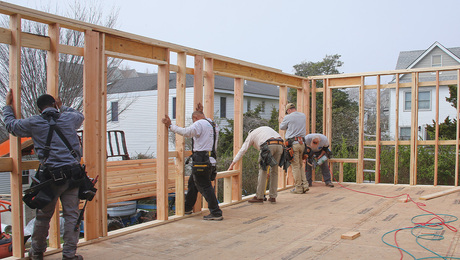Rehau flow-meter valve, frozen PEX loop

I have a Rehau manifold supplying three (well, now two) loops of 1/2″ pex (each loop 250′, one zone pump, slab sensor) embedded in a garage/workshop slab.
Long story, one loop froze (no glycol) and now apparently burst or at least pinholed, but I need to completely shut down that loop, as the other two are needed to heat the slab sufficiently.
This manifold has flow meters directly above each tubing coupling on the SUPPLY side which are little clear plastic tubes with red floating indicators that signify zero flow when they’re at the top, with gradations at 1/2, 3/4, 1 and 2 GPMs) on the bottom. They also have little springs that apparently serve to keep them at the top of the scale during periods of no flow. When the sensor/pump relay calls for heat, the pump comes on and the flow meters go to ~ 1 1/2 GPM indicated.
Except for the bad loop which stayed at zero when frozen, and now makes nasty noises when I try to open the valve. I found about this whole deal last night when I checked the system and found the pump on but cavitating and zero system pressure — zero flow to any of the loops. Shutting down the bad one and adding some water whooshed out a bunch of air, and returned flow to the two good loops.
The real question is about these valves, which are located directly above the tubing couplings on the RETURN side. With these valves, you can fine tune the flow to the loops, from ZERO indicated to whatever the max flow can be. Last night, I stabilized the system pressure at 14 lbs @ 100 F (~10:30PM) and checking this morning found guage indicating 13 lbs @ 55F. Turned setpoint up, pump comes on, flow normal, HWH kicks in so I upped the pressure to 18 lbs to compansate for whatever leak there might be, and left it running.
What I don’t understand is how the pressure could remain fairly even over 8 hours, even when one loop obviously has a leak. Is there some way that shutting down that loop’s valve on the RETURN side completely shuts down the loop, even though it seems it would be open to the supply pressure…or maybe it doesn’t but shuts it down enough so there’s only a very small leak that I can compensate for every few days until Spring?
I will look for fittings today that will adapt some sort of copper plug. Any tips as to what to ask for? The tubing is 1/2″ Wirsbo, with what look like compression fittings to the manifold.
LESSON LEARNED…put Glycol in any system that is intended to supply baseline heat in a garage slab.



















Replies
I just fired up a similar system last week. Perhaps if the line were frozen over a long length it prevented water from leaking out. 13 psi is not much. The connections to the manifold do unscrew. I reversed three of the outlets/inlets on my manifold so that the lines led up for staple up runs.
The pex pipes may be shrink fitted on to the manifold with Rehau's everloc system. If that is the case, you had better talk to Rehau. My fittings are simply screwed on. I do not know how what 'standard' the threads are though.
In a pinch You could order a couple of connectors from Rehau and use them to make caps.
I was surprised at how long it took to get all the air out of my system and how much the system pressure changed from 55 f to 125 f - from about 30 psi to 80 psi. I thought that I had a leak, but I now think that that the pressure loss occurred when the pump cavitated and the system cooled. After I bled the air and started pumping hot water the pressure rose back up.
The pex pipes may be shrink fitted on to the manifold with Rehau's everloc system. If that is the case, you had better talk to Rehau. My fittings are simply screwed on. I do not know how what 'standard' the threads are though.
I believe they are just threaded, they were installed by the concrete guy and supplied by his brother who is a plumber, but I watched the pour, and I don't remember any special tools. I'm on my way to the plumbing supply house to see what I can get. It was reassuring to see that I'm losing very little, if any, pressure over 8 hours with just the flow control valve off. Maybe 'cause I am running low pressure.
80 psi...holy cow, how high are you pumping? Is that your operating pressure?
Fix simpler than I thought. Picked up a 1/2" PEX ball valve to insert in the line, will provide positive shut-off, adds flexibility to potential future repairs.
Still curious, though, about how the Rehau valves/flow meters work...
My town's water system runs at 60-75 psi in my area. I filled the hydronic system by connecting it, via garden hose, to the domestic system. I left it at 80 psi, by the Rehau pressure gauge, overnight as a pressure test. Oh dear it dropped to 30 something, must be a leak. I could not find/hear any leaks so I increased the pressure. When I reheated the water it shot back up to 80 psi. When I started operating the system the pressure shot up to above 100. I have been bleeding air on and off over a period of three days. I am now running at about 35 psi.An ex-boat builder treading water!
Do you have one of those air handlers? Like a 3" diameter solid brass can with a little fitting at the top. Hissed air out of my system for days every time the pump went on, and was hissing pretty good on and off last night too.
Black magic to me how some of this stuff works.
No, I don't. I have been doing it manually. I'll have to get one. If your system is bleeding air, how can there be a leak?An ex-boat builder treading water!
This one is in line right above the expansion tank. Works great.
Once I shut down the leaking loop, the only air I had to bleed off apparently got in from the leak and/or my filling activities, probably air in the hose.
I just heard back from Halton Region, the water authority, the municipal pressure at the hydrant across from my house is 90 psi. They estimate that my house would be 5 psi lower.
How long was your system running before the line froze/broke?
An ex-boat builder treading water!
http://forums.taunton.com/tp-breaktime/messages?msg=40123.9